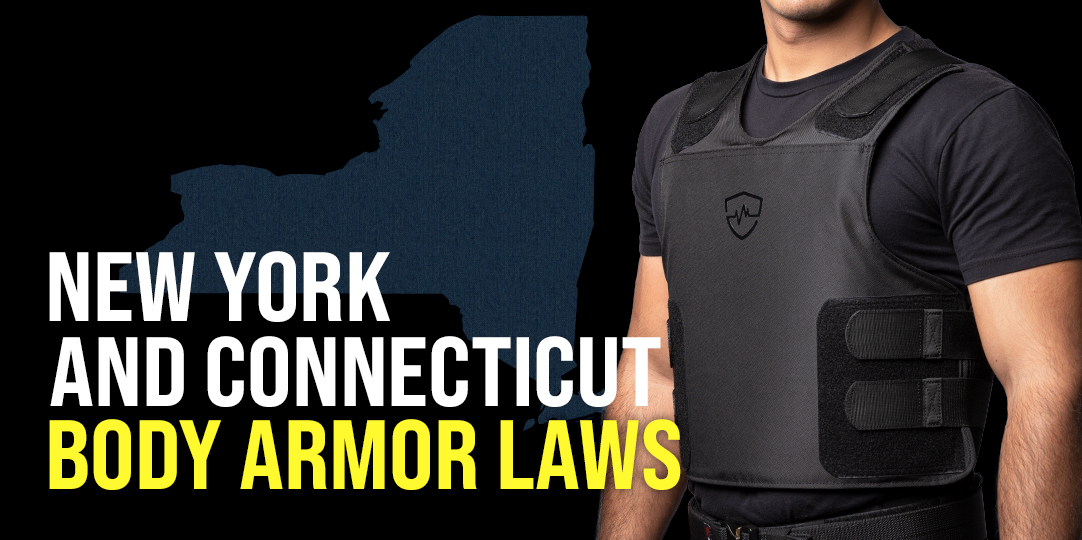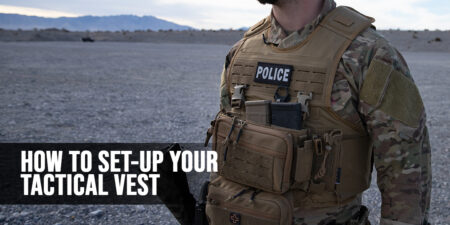For most consumers body armor or bullet proof vests seem like a fairly benign purchase. Even if you do not work in law enforcement or security, what harm could there be in purchasing a piece of protective gear that would shield you from gunfire? Outlawing the purchase of body armor could almost seem akin to banning the use of a seatbelt in a car or wearing a life jacket on a boat. However, a few states have done that very thing.
California had attempted a version of such a law that was quickly found unconstitutional, yet laws restricting body armor are on the books in New York and Connecticut. It is already illegal for convicted violent felons to possess body armor and it is illegal to wear armor during the commission of a felony. So long as you are not in one of these prohibited categories, it is perfectly legal to own body armor for your safety and protection.
New York Body Armor Laws
One of the two states with heavy restrictions on the purchase of body armor is the Empire State. In 2022 New York passed Senate Bill S9407B into law.
This law prevents the purchase and sale of “body vests” to anyone except law enforcement, members of the US military and people of certain occupations, such as private security guards.
Additionally, this law requires that all transactions for the buying and selling of “body vests” must be conducted in person regardless of if the buyer is a police officer, peace officer, US military service member, or another eligible profession.
Curiously, this ban on “body vests” is only on soft types of armor which would stop handgun calibers and not the hard armor intended to protect against rifle fire. Soft armor is commonly purchased by taxi drivers to prevent them from being mortally wounded by robbers masquerading as passengers. This is what many people incorrectly refer to as a bullet proof vest.
Prior to this new law, New York had laws in place which penalized criminals for wearing body armor while committing a crime as do many other states. It seems as if now the legislators wanted to further prevent criminal possession of body armor.
Instead, it may be affecting law-abiding citizens to a greater degree. This is not just a new law for New York City. This ban on the sale, purchase, or delivery of soft body armor affects the entire state of NY.
Connecticut Body Armor Laws
New York is not the only state to put a body armor ban in place. Its southernmost New England neighbor, Connecticut, has had similar legislation in place for almost 25 years.
In the state of Connecticut, per Connecticut Code – Section 53-341b, it is illegal for convicted felons to possess body armor. It is also a Class B misdemeanor to transfer body armor to another person without meeting them face to face.
The latter part of this ban on the transfer of body armor makes mail order purchases of body armor illegal. This law has been in place since 1998 and has been amended a few times in the following years. Unlike New York it does not solely restrict transactions of soft body armor, but appears to cover armor of every category with its definition: “body armor means any material designed to be worn on the body and to provide bullet penetration resistance”.

Effective Ways to Purchase Body Armor in NY and CT
While these laws exist, there are ways to legally get around these legal prohibitions. The best method is to simply have the body armor delivered to an address in a neighboring state that does not have such legislation, such as Pennsylvania. After purchasing the armor online or over the phone, one need only visit the address out of state where it was delivered, pick it up and take it home. This could be an address of a friend, family member, or a Post Office Box of some kind. No crime has been committed.
In Connecticut, the body armor must be purchased in a face-to-face transaction. If the retailer does not have the particular type of armor that you are looking for and is unable to order it or refuses to order it, you are not necessarily out of luck. The other route to obtain body armor is to follow the New York model and have the armor shipped to an address in another state where it can be picked up by the customer and keep them from running afoul of Connecticut’s laws. States close to Connecticut where this type of transaction would be legal include Rhode Island, Massachusetts, and New Jersey. Dedicated retailers of body armor such as Safe Life Defense make this process easy and painless.
As it is currently written, New York’s law only takes aim at soft body armor. This would not include tactical gear such as a plate carrier, which on its own offers no bullet resistance, but can be fitted with a hard metal plate effective at thwarting rifle caliber bullets or Magnum handgun rounds.
What Will Body Armor Laws Look Like in the Future?
There are politicians who do not think that New York’s new law goes far enough. Jonathan Jacobson, a New York State Assemblyman has introduced legislation entitled A. 352. This bill would deny New Yorkers a right to personal defense by putting a confiscatory ban on body armor into place. As a law, this would not only make the sale and purchase of body armor illegal, but would make its possession prohibited.
The first offense is a Class A misdemeanor which includes a sentence of one year in jail and a $5000 fine. Subsequent possession of body armor would be considered a Class E felony, which means the potential prison sentence could be up to four years with a $10,000 fine imposed.
If passed as written, anyone currently in possession of body armor would have to surrender it to the police immediately or face the penalties. Police would be exempt from this legislation as would other eligible professions as defined by the state such as security guards or members of the US military.
New York came close to passing a full restriction against body armor in 2009. Although it was defeated, this new piece of legislation, A.352, could gain some traction and be passed into law. Should it not pass, New York politicians would more than likely set their sights on outlawing more classes of body armor such as hard armor plates in the next legislative session.
In the future, legislation of this sort could be coming to other states, or a federal restriction could be enacted if such support were to be picked up by either political party. Sometimes these laws are one-off pieces of legislation confined to one state, but often they are copied, rewritten slightly, and introduced to other states with similar political outlooks.
There is a great deal of misinformation about the legality of non-law enforcement personnel being able to purchase or even own body armor. Much of this unfortunately comes from manufacturers and resellers at the wholesale, distributor, and retail levels. Some companies do not want to sell their wares to the general public and may brand their product as for sale to “Law Enforcement Only”. This is usually a decision or policy by the manufacturer or the retailer in some cases and has no bearing on the actual law. It is enforced downstream by dealer and distributor networks who do not want to lose the support of the manufacturer if their armor is sold to private citizens.
Manufacturers like Safe Life Defense know that body armor has saved the lives of tens of thousands of people worldwide, if not more. We advocate making body armor accessible to law-abiding citizens because we know how important it can be to properly protect themselves, their families, and their communities. Want to learn more about common misconceptions regarding body armor? Check out this blog and shop our products today to discover the best body armor for you.






